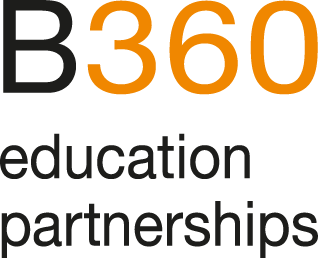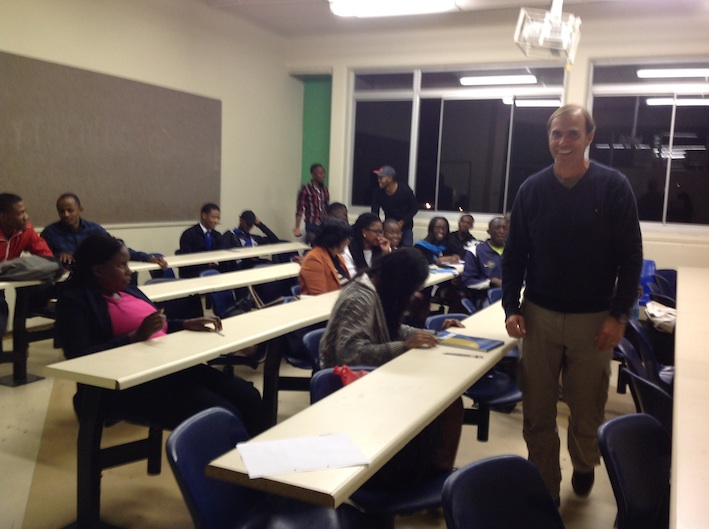Carlos González
Credit Suisse Director
Faculty of Management Sciences
Department of Accounting, Economics & Finance
Namibia University of Science and Technology
July 29 – August 13, 2016
Instead of writing a traditional assignment report, I have summarized some of my impressions from my B360 assignment at the Namibia University of Science and Technology (NUST). I hope my observations and experience can contribute in any way to this program, which I think is of great value already.
My schedule and audience
Bachelor full time students in International Finance (8h), Bachelor full time students in Development Economics (8h), Bachelor part time students in International Finance (6h), Bachelor part time students in Development Economics (6h), Master students in Logistics (8h), a Public Lecture (1.5h). Lecturing for the Master Students in Logistics was just a favor to Steward McGuire, another Credit Suisse volunteer expert at NUST, and his class.
Number of Students on average: Full-time Bachelor class: 35-40, Part-time Bachelor class: 15-25, Master Students: 15
Content and approach
Public Lecture: I did on FDI, attracting factors and impact on the host economies. For Development Economics, my co-lecturer gave me full freedom on my lectures. On all topics, I used case studies but always with a clear link to the particular situation of Namibia. For International Finance my co-lecturer gave me a clear curriculum and I spent most of the time explaining the basics of various topics such as FX and FX Markets, Balance of Payments, Government Debt, etc. Furthermore, I used the following case studies: Eurozone Crisis, Twin Deficit in the US, Monetary Policies in China, Tequila and Asian crisis, George Soros and the Black Wednesday, Nam Dollar peg to ZAR, etc. The Lectures for the Master Students in Logistics included a variety of topics of the above courses. Exams: I prepared the questions for the exam in both lectures.
Preparation work
Overall, I studied the 4 recommended books (2 each) and roughly 110 articles and papers. Most of the material I got from the internet. The preparation work at home was roughly 60 hours plus another 100 hours while on assignment. I tried to steer my lectures according to the existing knowledge of the students and co-lecturers as well as to their wishes. The effort for Development Economics was much higher as it touches all aspects of Economics.
Teaching Method
I prepared my slides in a way that they would not provide the answers but only the relevant information (e.g. Chart on GDP elasticity of employment for Namibia 2010-2015) and questions (e.g. what could be the reason that it has declined?) so that it would allow the students to discuss and conclude the answers themselves. I used 5 dozens of statistical charts and 1 video on the Eurozone Crisis.
Feedback and results
All students liked the video. I could not show more videos for technical reasons but I would recommend it as a powerful tool. Despite not having made a deep analysis I think I achieved the highest student’s satisfaction in the following order:
1. Master Students Logistics
2. Part-Time Students Bachelor
3. Full-Time Students Bachelor
My reading is that master students and part timers liked the approach of my lecture, as they had the chance to make deductions by themselves instead of just listening to and noting down my explanations. The participation was intensive and the quality of the questions raised and the points discussed was too. For obvious reasons, these students have more practical and life experience so that they are in a better position to profit from this lecturing method. The full-time students did not like my lecturing method as much, as they wanted structured material with the answers that would allow them to prepare for the exam. They did also participate much less as they lacked the basic knowledge and probably also the practical and life experience to do so.
Support at NUST
Support from the International Office at NUST and the local lecturers was great. Special mention to Nico Smit, International Officer and local B360 program coordinator, as he did not only take brilliant care of us but also contributed greatly to our understanding of Namibia. He organized a radio interview for us and also tried to organize a TV interview, which finally did not work out. He had also planned a city trip for us, which unfortunately did neither work out due to our shortage of available time.
All in all a great experience and an absolute highlight that I will certainly never forget. Thank you for inviting me and for the time I could spend in this impressive country.




